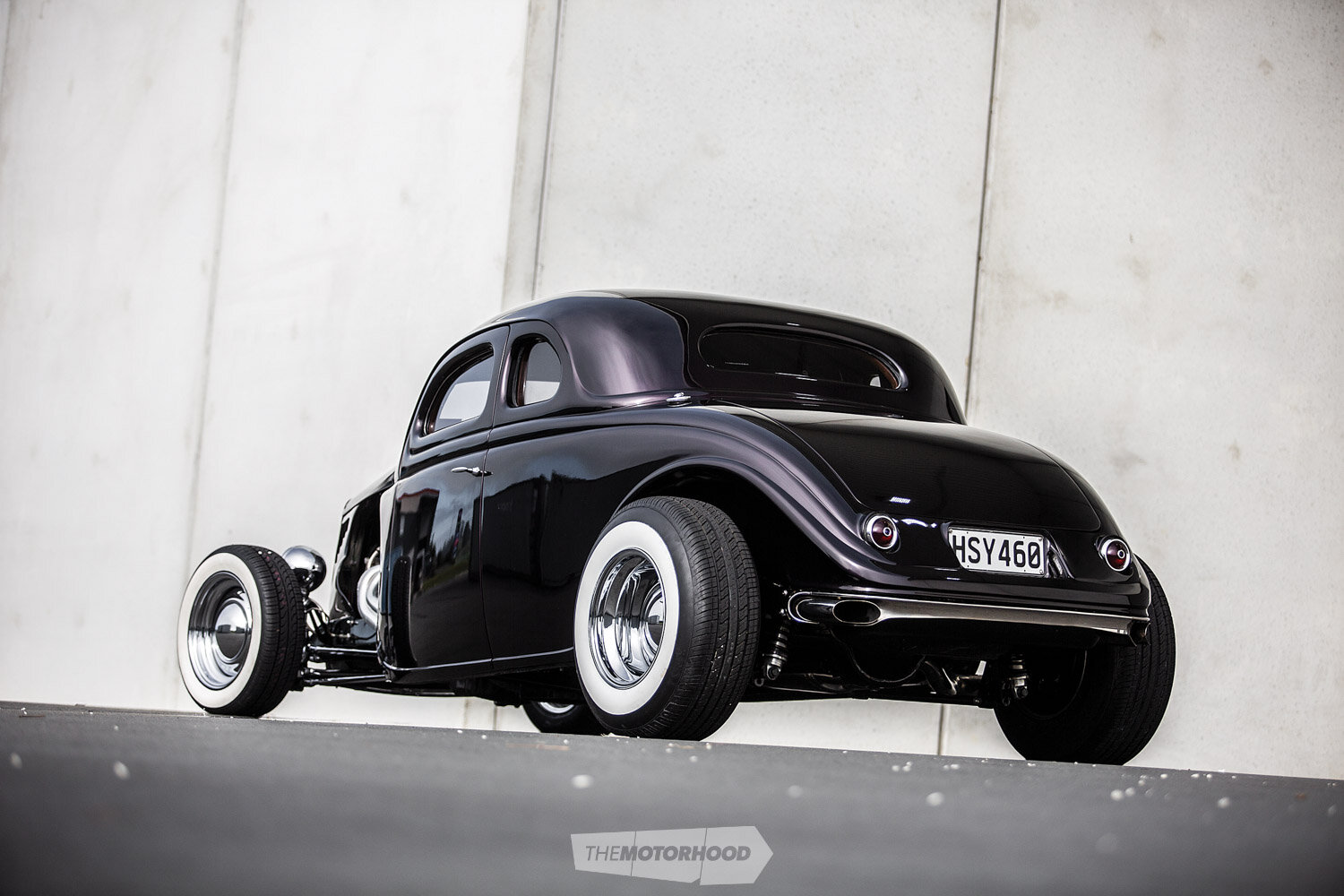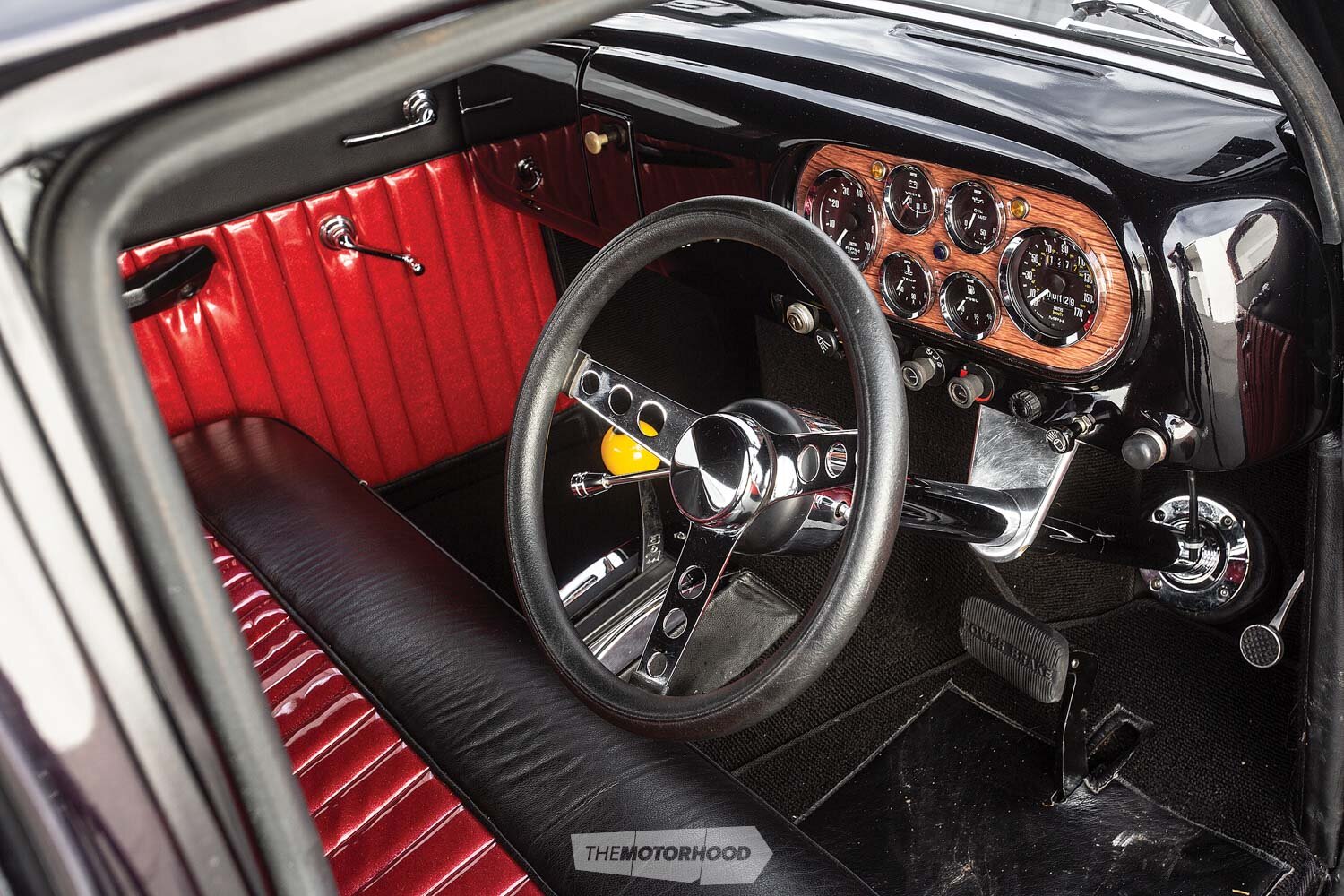John Fenton had been out of the hot rod scene for a while when he started on this ’35 coupe build, and there was no way that he’d be half-arsing his re-entry

It’s that time of year — chances are that quite a few of you readers will have recently had to dig deep and fork out a pile of hard-earned to the IRD. You’d rather flee the police than try to escape the long arm of the taxman. One year, when John Fenton needed to come up with a large sum in a short time, he did what he had to do and sold his nearly complete ‘Road Hog’ to get there.
Quite a few years after that sour experience, John was on the turps with his late brother’s mate Marlon Galloway, and conversation moved to the Model A that John owned before buying the Road Hog.
“I said I would like to build another pre-’49 car one day,” John recalls. “Marlon mentioned he had an old coupe in his shed that had been there for years. I bought it the next day.”
In the 15-odd years that John had been out of the scene, though, things had changed dramatically. Rather than start effectively from scratch, he rejoined the Whakatane Rod & Custom Club and began to seek advice on what he needed to do to build a new hot rod.
“Lindsay Hay lent me his New Zealand Car Construction Manual and we followed it to the letter,” John explains. “When cert time came, it flew through it, just needing some minor mods.”

Of course, the build had to start somewhere, and first things first — “I scrapped the old chassis and bought a rolling chassis off Duane Jones at Kiwi Connection,” John mentions.
That move was for the best, because those Kiwi Connection chassis are damn fine pieces of gear. Equipped with full Super Bell front suspension, four-linked rear, and construction far superior to that of the old ’30s frames, the switch immediately brought John’s project into the 21st century without sacrificing any of that essential old-school style.
While John was gunning for a more traditionally styled rod, he wasn’t interested in building a generic carbon copy of anything else in the scene. Fender-less, chopped, channelled, and raked were necessities — he’d work the differences around those requirements.
What that meant was a lot of revision to the body — an all-steel, New Zealand–new 1935 five-window coupe. It’s still all steel, but once John hauled it over to Iron Rides for Shannon Peake to tuck into, plenty of that 80-year-old metal ended up in the skip — most notably the entire floorpan — to clear the six-inch channel underneath.

As John found the capable Steve Docherty and Peter ‘Chrispie’ Chrisp a little closer to home, he relocated the coupe for them to sort the three-inch roof chop, which is by far the most obvious deviation from standard, although it’s just one of many.
The boys also saw to new rear inner guards, rear quarters, and door frames with hidden hinges and bear-claw latches. Underneath, the six-inch channel meant that a full new floor and rocker panels needed to be made up and welded in, along with a big transmission tunnel and recessed firewall to clear John’s chosen big block Chev–and–TH400 combination.
Originally out of a 1979 Chev truck, an ample number of cubes was all the old 454 brought to the table. After a rebuild by Lindsay Hay, it’s packing enough to put the ‘hot’ in hot rod. Bored 30 thou over and given a set of flat-top pistons, along with Edelbrock Performer RPM alloy heads, there’s a bit more compression on offer, and a Comp Cams roller cam and roller rockers to make the most of it.
An Edelbrock dual-plane intake and 750cfm Holley vacuum secondary carb keep it all streetable, and you can’t help but note the wicked set of headers — fabbed up by Squeak Bell, and feeding into twin 2½-inch exhausts leading a tortuous route to two custom mufflers that enter and exit at the same end, with caps just in front of the rear wheels.

A bit less head-scratching was needed for the remainder of the driveline, but with a TH400 built by Chuck Mann and an LSD-equipped Currie nine-inch diff, it’s all up to the task.
It all slotted into place perfectly too, although the big block presented a bit of a challenge. It’s a hefty piece of gear in comparison to whatever side-valve clunker originally sat between the ’35’s rails, and surely produces a bit more heat, but, rather than remove the hood side covers entirely, John thought a little more creatively.
A circular cutaway has been smoothly worked into the side panels, gelling with the swooping lines of the ’35 coupe, and the hood has been given a subtle flame swage job by metalworking master Ron Ronaki. That’s not all — Steve Docherty also made up the custom stainless-steel grille, which fits the direction of John’s build far better than the original Sylvester Stallone chin.
The hot rod might have flown through its cert, but it was far from finished.
“I left it in bare metal for a few years and had major problems with brakes — mainly master cylinders and boosters. Some of the stuff people sell is just crap,” John says. “When I got it certed, the brakes were acceptable, but I was never happy with them.”

At a bit of a crossroads, John pulled the car completely to bits and had the chassis powder-coated and the whole exhaust ceramic-coated by Taupo Performance Coatings. He also had the interior taken to by Pete Tyrell to be dressed in black leather and red flaked vinyl to match the old-school style prevalent in the narrowed ’49 Bonus dash, Smith’s gauges, and Grant steering wheel. To finish the whole lot off, Murray Linton was given the reins to the final panel and paint, completed in a matching black Dulon lacquer with red pearl.
So, two years after that strip-down, do you reckon John would be happy with where the hot rod was at? Not really, no — no brakes again!
“After tearing what’s left of my hair out over the past summer trying to sort the problem, I took it over to Baz Hanwright, who also fabricated the roll cage,” John says. “It turns out the problem was in the booster, so three boosters and four master cylinders later, it stops like a new car!”
A new car is essentially what it is too, not that you’d be able to tell by looking at it — a cohesive blend of modern technique and traditional design that is nothing quite like any other hot rod out there. That means that John’s build has achieved everything he set out for it to do — 15 years out of the scene can’t keep a natural-born hot rodder down.

John Fenton
Car club: Whakatane Rod & Custom Club (WRCC)
Age: 65
Occupation: Builder
Previously owned cars: 1957 Chev sedan, 1928 Model A Tudor hot rod, Road Hog, 1956 Chev truck, 1971 Pontiac Firebird big block, several V8 Holden utes and cars, 1961 Chev Bel Air, 1961 Chev bubbletop
Dream car: Too many to list
Why the coupe? I wanted another early steel car
Build time: 12 years
Length of ownership: 14 years
John thanks: Squeak Bell; Lindsay Hay; Steve Docherty; Peter ‘Chrispie’ Chrisp; Dave Cusack (a founding member of WRCC), for wiring; Murray Lincoln, for paint; Pete Tyrell

1935 Ford five-window coupe
Engine: 454ci big block Chev, 30-thou over-bore, flat-top pistons, Comp Cams roller cam, Edelbrock Performer RPM alloy heads, Comp Cams roller rockers, Edelbrock dual-plane intake, 750cfm Holley vacuum secondary carb, Vintique reproduction ’34 tank, braided stainless fuel hose, Carter electric fuel pump, Accel distributor, MSD ignition coil, custom headers, header caps, 2½-inch exhaust, custom mufflers, Aussie Desert Cooler alloy radiator
Driveline: GM TH400, 3000rpm stall converter, Currie nine-inch diff housing, four-spider LSD carrier, 31-spline axles, 3.5:1 diff ratio
Suspension: Complete Super Bell front end, four-link rear, Aldan adjustable coilovers
Brakes: Wilwood master cylinder, custom pedal, Wilwood front disc brakes, dummy finned drum-style covers, Ford rear drums
Wheels/tyres: 15×6-inch and 15×10-inch Cragar Smoothies, 205/60R15 Firestone front tyres, P255/70R15 Federal Couragia rear tyres
Exterior: Three-inch roof chop, six-inch channel, new firewall, new rear inner guards, new rear quarter panels, new door frames, hidden hinges, bear-claw latches, flame-embossed bonnet, stainless-steel grille, custom rear bumper, custom exhaust tips, custom indicator stands
Chassis: Kiwi Connection 1934 chassis
Interior: 1949 Ford Bonus dash, Nissan Navara seats, black leather upholstery, metalflake trim inserts, Grant steering wheel, Ididit steering column, B&M shifter, Smiths gauges, roll cage
Performance: Untested









